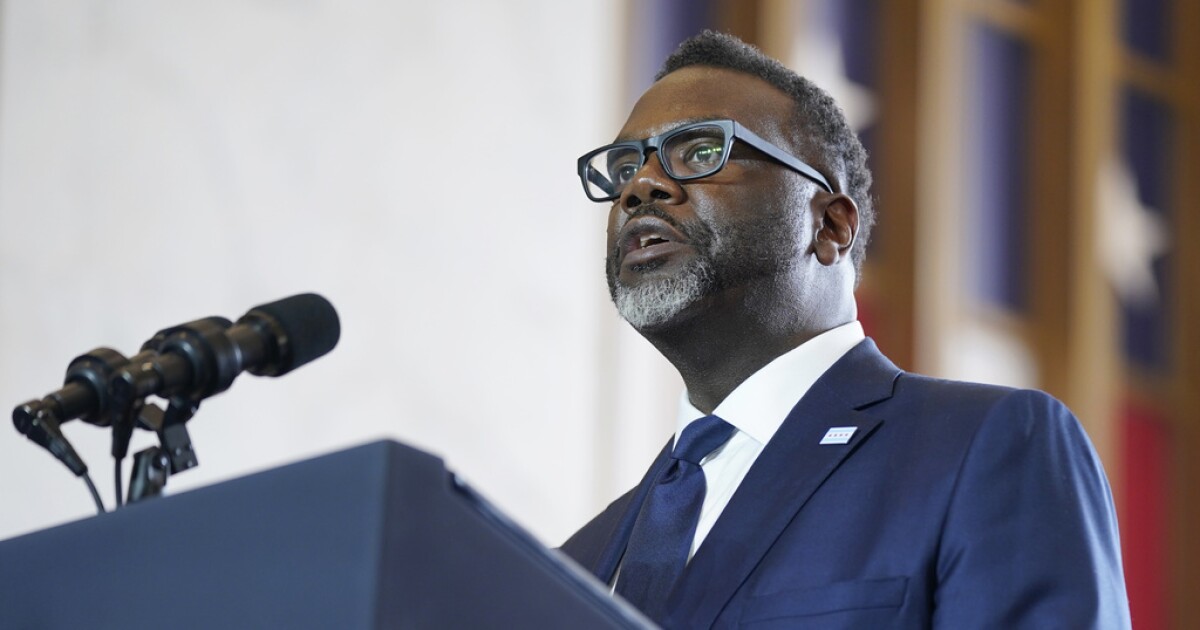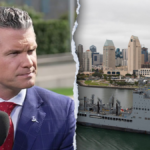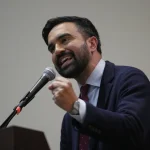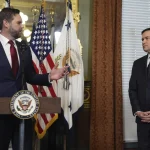

Chicago Mayor Brandon Johnson assumed the leadership role in mid-2023, and since then, his administration has been hit with obstacles that are plaguing several mayors in Democratic-led cities.
Johnson, a progressive Democrat, promised to bring comprehensive reform to the city’s public safety, education, and economic sectors. He inherited a barely stable financial budget, a struggling youth population, and an influx of immigrants pouring into Chicago.
BOEM HOLDS DELAYED GULF OF MEXICO OIL AND GAS LEASE SALE
Here is a list of Johnson’s key moments, obstacles, and controversies he’s had since becoming mayor in 2023.
An immigration crisis
Lori Lightfoot, a Democrat, was the mayor when Gov. Greg Abbott (R-TX) began sending busloads of migrants to Democratic-run cities such as Washington, D.C., New York City, and Chicago. However, she left just as the crisis worsened, leaving the growing problem in Johnson’s hands.
Since August 2022, more than 26,000 migrants have been bused to Chicago, most of them legally. As most of them arrived without having plans for a home, thousands have taken refuge in O’Hare International Airport and police stations scattered throughout the city, as well as on the streets by the hundreds.
Johnson has blamed the “international crisis” on Lightfoot, saying he did not receive any assistance from the previous City Council to handle the problem.
“Did you know when I was sworn in in May, the previous City Council did not budget for 2023’s migrant mission,” the mayor said in November. “So, not only have we stood up the full force of government in a collaborative way, we did it without the previous City Council even providing resources for it.”
In October, Johnson reversed his decision to visit the United States’s southern border two weeks after announcing his attention to travel to the site of illegal immigrant crossings. Instead, he said he wanted to focus on adding shelter space for the city’s immigrants who have already arrived.
The mayor announced in September that he planned to move more than 1,600 immigrants from police stations to permanent camps before winter. However, that plan is now on hold after Gov. J.B. Pritzker (D-IL) rejected a location over environmental concerns. The state was set to allocate $65 million in funding for a site at Brighton Park, with plans to house up to 2,000 immigrants. A similar plan at Morgan Park is now on hold, as well.
Johnson’s plan to combat homelessness by raising taxes on the city’s real estate transfers will head to voters in 2024. The “Bring Chicago Home” initiative is projected to take in more than $100 million in revenue per year, which will be funneled into programs that seek to alleviate homelessness in the city. Johnson has said he is “confident” that the measure will pass.
“The people of Chicago had an opportunity to vote for someone else who wasn’t supporting this initiative,” Johnson said in early November. “So if you’re asking me [about] my confidence, my confidence is as strong as the people who sent me to do the work.”
Problems with City Council
Johnson’s top ally in the City Council, Alderman Carlos Ramirez-Rosa, resigned after he used his body to block another council member, Alderwoman Emma Mitts, from entering the chambers minutes before a procedural vote on the proposal regarding Chicago’s sanctuary city status.
Ramirez-Rosa was opposed to pulling the city’s sanctuary status, which has been in place for three decades. He resigned as the Chicago City Council’s floor leader and chairman of the Committee on Zoning, Landmarks, and Building Standards, the latter effective Dec. 1. Johnson cast the tiebreaking vote against censuring Ramirez-Rosa.
Immigration has driven a wedge in the City Council. In May, the Chicago City Council announced that $51 million in financial aid from the budget surplus would go toward addressing the influx of immigrants bused from Texas, and the announcement received heavy backlash from Republicans.
Several aldermen on the City Council expressed concerns about Chicago issuing funds to address immigration when the city is grappling with disparity among the existing homeless population and minority communities. Aldermen Anthony Beale and Raymond Lopez led the charge to bring the city’s sanctuary status on a ballot referendum, but Johnson’s allies defeated that measure.
“It is a shame that you all are scared,” Beale said via CBS News. “What are you scared of? To let the people have a voice? What are you scared of? The truth? Are we scared of the truth here? Are we afraid that the people are going to tell us that we are spending money frivolously in this body? Are we afraid that the people are going to tell us that we are headed in the wrong direction? Why are we afraid to let the people speak?”
Working with the Chicago Police Department
Johnson selected Chicago Police Department Counterterrorism Chief Larry Snelling as the next Chicago Police Department superintendent in August. His appointment came after a revolving door of superintendents over the last year.
Former Superintendent Eric Carter, who Fred Waller replaced, stepped down following Johnson’s inauguration on May 15. In February, Carter replaced former Superintendent David Brown, who had resigned after Lightfoot lost her reelection bid.
Snelling’s selection was one of Johnson’s first moves toward building a relationship with law enforcement and police unions, most of which did not support him in the general election for mayor.
Since the mayor’s inauguration, law enforcement figures and leaders have expressed concern that Johnson’s approach to crime would result in higher crime rates and unsafe streets.
The Fraternal Order of Police in Chicago has been critical of Johnson’s approach to public safety and policing. Union members have also criticized the Johnson administration for the number of immigrants staying in police stations. President John Catanzara, a strong opponent of Johnson, called the immigrant situation “unacceptable and ridiculous working conditions.”
Tensions between Johnson and law enforcement are only growing. On Dec. 13, the City Council sided with the mayor and rejected changes backed by the Fraternal Order of Police to decide serious police discipline cases behind closed doors rather than in public by the Chicago Police Board. Johnson urged the council to reject this request, stating in October that it is “crucial that disciplinary cases be handled in a manner that allows for public transparency and true accountability.”
Education
Johnson hand-picked several new members to the Chicago Board of Education in July, including parents and former and current educators of the Chicago Public Schools system, as well as community activists. He selected Jianan Shi, the executive director of the nonprofit organization Raise Your Hand for Illinois Public Education, to serve as head of the school board.
The mayor entered his administration with enormous support from the education community. The Chicago Teachers Union and other affiliated teacher and parent groups overwhelmingly endorsed Johnson for the 2023 mayoral race — shunning Lightfoot, whose tenure was marred by clashes with Chicago Public Schools over funding and COVID-19 guidelines.
His appointments to the school board reflect his reconstruction plan to approach education with a needs-based funding model. Johnson and the school board inherited several obstacles, particularly when it came to the system’s budget. CPS is projected to have a $628 million budget shortfall in the 2025-2026 school year if the state does not produce more funding.
Johnson’s appointments are significant as he will be the last mayor of Chicago who will hand-pick the members moving forward. Illinois’s largest school system, comprised of an enrollment of more than 30,000 students, will first receive 10 elected members next year during the November 2024 election. They will be sworn into office in January 2025.
The board of education is already receiving some backlash after it announced it is pushing to end selective enrollment to encourage students to attend their neighborhood schools. According to the board’s resolution passed in December, some 76% of students do not attend their neighborhood high school in Chicago.
Supporters of this proposed measure believe it would end the culture of “haves” and “have-nots” that disproportionately affects black communities in the city, particularly when it comes to standardized testing and other education models. On the other side, critics have argued this will hinder academically gifted low-income students’ ability to get into higher quality schools that will better prepare and educate them. They also say it takes away the rights of minority parents to “choose their child’s education,” according to the Chicago Sun-Times.
Budget deviates from liberal stances
Johnson passed his first budget as mayor on Nov. 15, which is estimated at $16.77 billion. Lightfoot’s administration left Johnson’s with a projected $85 million budget gap for his first year.
The mayor’s budget takes a step away from popular liberal stances, holding steady on property taxes and slightly increasing spending on law enforcement.
Under Johnson’s budget, $150 million will be geared toward asylum-seekers. The police budget will be raised to nearly $2 billion thanks to a $91 million increase in 2024, and positions to detectives, a campaign promise, will be boosted by 100. Homelessness investments also will increase to $250 million.
Approval rating
Johnson earned the lowest approval rating for a Chicago mayor starting his or her term in modern history in mid-November. A poll from the Illinois Policy Institute conducted by conservative-leaning Echelon Insights found that Johnson has a 28% approval rating.
CLICK HERE TO READ MORE FROM THE WASHINGTON EXAMINER
His rating is just 1 point above Lightfoot’s when she lost reelection and 1 point above former Mayor Rahm Emanuel’s in 2016 in the aftermath of the officer-involved shooting of 17-year-old Laquan McDonald.
Johnson’s low approval rating is a sign that Chicago may not be responding to his liberal policy agenda, of which he has earned several successes in the past few months. His lowest approval ratings came from crime and public safety at 66%, followed by 64% in immigrant management and 63% in housing and homelessness.




